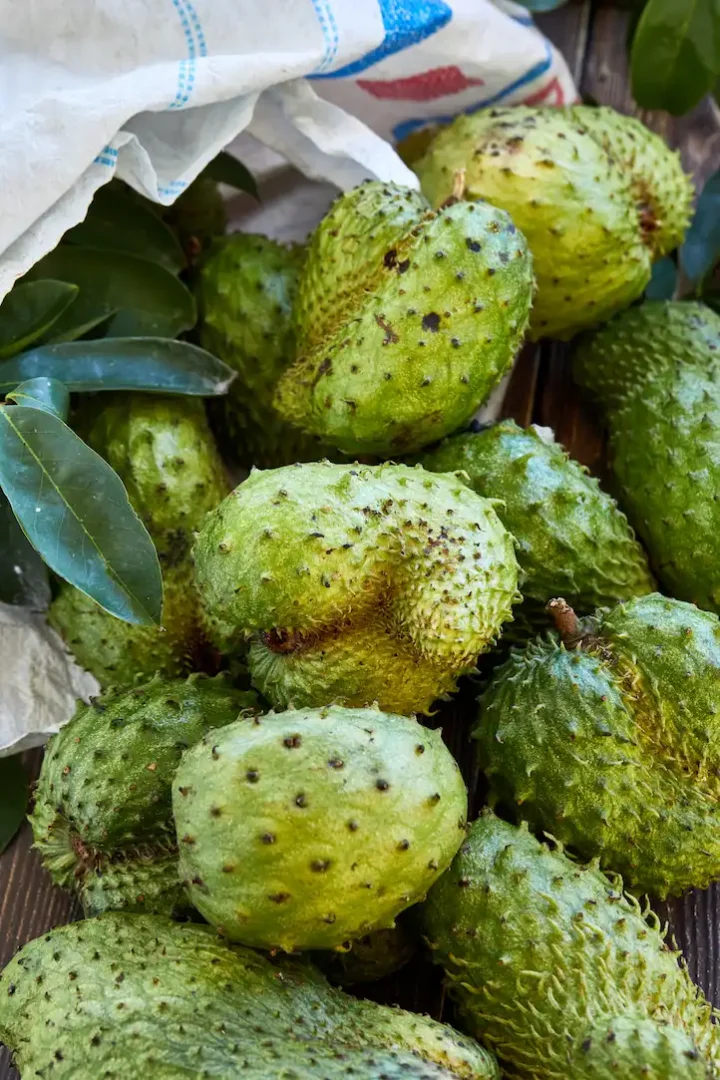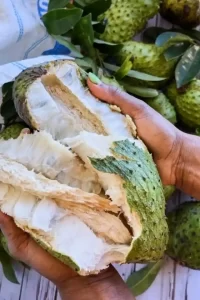
Soursop, known as Guanabana in Jamaica, is a popular fruit in the region, also referred to as Graviola and Brazilian Paw Paw in other parts of the world. The scientific name for soursop is Annona Muricata. The soursop tree is commonly found throughout the Caribbean, Central and South America, and Southeast Asia, but it thrives best in warm, humid climates with ample rainfall, making Jamaica an ideal location for the tree to flourish.
The evergreen soursop tree can grow up to 30 feet tall and the soursop fruit varies in size and shape, with some soursops being oval or heart-shaped while others have irregular shapes. The fruit skin is green and covered with spines, which spread apart and become softer as the fruit ripens. Soursops are generally picked when mature, but before they ripen, to avoid them falling and getting damaged. A ripe soursop fruit is soft and has a sweet, fruity scent, and its spines will break off easily.
When ripe, the soursop fruit is edible and can be consumed raw. The fruit tastes like a combination of pineapple and banana, and its flesh comprises easily separated segments, each containing black, oval seeds that are smooth and hard. These segments surround the fruit’s core or heart, which is also edible. The fruit’s flesh and core are usually eaten, while the skin and seeds are discarded.
In Jamaica, soursop is commonly used to make juice, which involves adding water to the pulp, squeezing or mashing it with the hands to extract the juice, and then straining it to separate it from the pulps. The juice is usually sweetened with milk or with lime and sugar. Soursop leaves are also used to make tea, which is commonly consumed by children in Jamaica, and it is often mixed with red root and dry banana leaf to make a nutritious tonic.
Consuming soursop raw from the tree is the best way to obtain all its nutrients as making juice or ice cream does not preserve all of its nutritional content. Soursop fruit is rich in vitamins and minerals such as vitamins C and B6, potassium, magnesium, and fiber. It provides about one-third to one-half of the daily recommended amount of potassium, which can help reduce high blood pressure by reducing the sodium in the body. Additionally, soursop contains natural compounds that studies have shown to have anti-inflammatory properties. Soursop leaf tea is also believed to relieve pain and help boost the immune system, and some studies have suggested that soursop leaves may contain potential cancer-fighting properties.
Soursop is not related to jackfruit or cactus, even though they all have green, prickly skin. Soursop belongs to the Annonaceae family, which includes other fruits like sugar apples. Jackfruit belongs to the Moraceae family, while the cactus belongs to the Cactaceae family, and they have distinct differences in their appearances, tastes, and uses.
In conclusion, soursop is a versatile fruit with many health benefits, and consuming it raw is a valuable addition to any healthy diet.
Source: https://jamaicanfoodsandrecipes.com/soursop-guanabana-fruit/






![Grow 10 Pounds Of Potatoes In Just 30 Days With Plastic Containers [Video]](https://naijatipsland.com/wp-content/uploads/2024/11/466928459_444053232089974_5323815438965424433_n-100x56.jpg)





Interesting